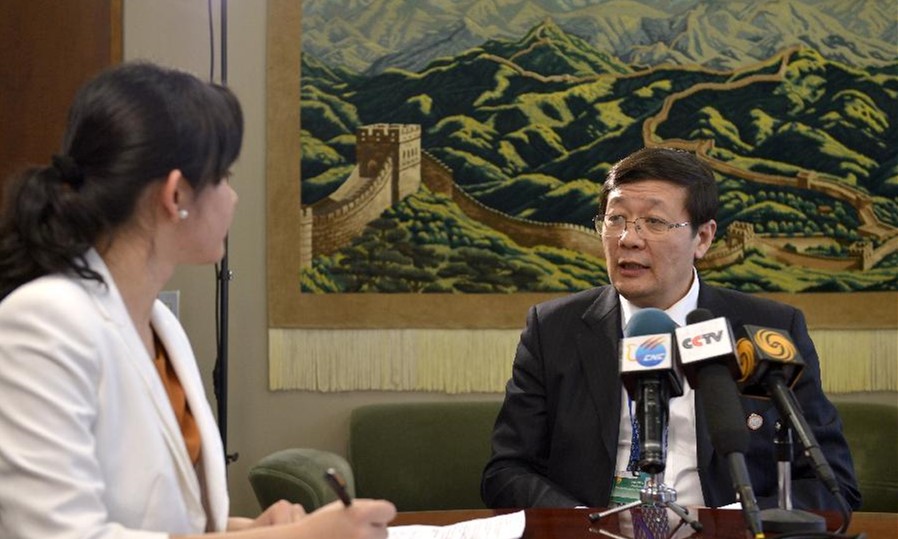China-Japan economic ties hamstrung in short term

China’s Finance Minister Lou Jiwei (R) speaks during an interview at the World Bank headquarters in Washington, D.C. He said that China has always welcomed the United States and Japan to join the Asian Infrastructure Investment Bank (AIIB).
Although the long-term trend of closer China-Japan economic cooperation is inevitable, the situation is not optimistic in the short term, according to the Blue Book of Japanese Economy released on May 25.
According to the blue book, Japan’s GDP grew by 0.4 percent in 2015. It is expected to maintain a slow recovery in 2016 mainly due to the government’s decision to raise the consumption tax rate from 8 percent to 10 percent effective from April 2017. However, the economy may shrink in 2017 as a short-term consequence of the same policy.
In the next few years, the downward pressure on the global economy and the uncertainty brought by adjustments in China’s economic structure will negatively affect China-Japan economic cooperation. China and Japan are important trade partners, but territorial disputes are a persistent source of tension. The two countries cannot be expected to make progress in economic cooperation in 2016 if the political issues are not resolved, according to the report.
The report also predicts diminishing demand within China’s manufacturing industry as the nation continues to adjust its economic structure. Japanese direct investments will decrease as enterprises leave China or reduce investment in response to rising labor and purchasing costs as well as declining sales amid fierce competition. Reduced investment in the manufacturing industry will also seriously impact the export of related Japanese products to China.
It is very likely that Japan will have a trade deficit for the fifth straight year in 2016 while trade between China and Japan will continue to decrease, according to the report. China will mainly import electric machinery, computer numerical control machine tools, chemicals and other products. Photovoltaic cells and mobile automatic data-processing machines, such as laptops will be China’s primary exports to Japan.
China’s “Belt and Road” initiative presents new opportunities for Asian economic development, and the two countries may also find new venues for economic cooperation, like infrastructure or finance. The report suggests that China and Japan will both benefit from bilateral economic cooperation under the framework of the “Belt and Road” initiative as long as the Japanese government is willing to demonstrate more openness and understanding.
However, the wrong attitudes toward history and misguided security policies adopted by the administration of Japanese Prime Minister Shinzo Abe have aggravated relations between the two countries. US President Barack Obama’s “Pivot to Asia” policy has also caused Japan to deviate from comprehensive, strategic and reciprocal relations with China.
According to the report, an Asian development agenda that includes Japan will have a great effect, considering Japan’s economic strength and influence. At the same time, Japan’s economy will benefit from a more developed and prosperous Asian economy. Although Japan and China have wrestled over issues such as the Asian Infrastructure Investment Bank, Japan will be an active participant in Asian development in the future.
Asia has become a community of common destiny shaped by the ideas of joint contribution and shared benefit proposed by the “Belt and Road” initiative, therefore both China and Japan will pursue their sustainable economic development within this common destiny, according to the report.
